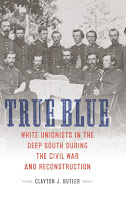New Arrival:
• True Blue: White Unionists in the Deep South during the Civil War and Reconstruction by Clayton J. Butler (LSU Press, 2022).
Close study of Southern Unionism during the Civil War era has proceeded in leaps and bounds over recent decades, with the scholarship's greatest focus placed (understandably) on the more numerous proslavery Unionists of the Border State and Upper South regions. This makes Clayton Butler's concentration on Deep South Unionists welcome and important. In his book True Blue, Butler "investigates the lives of white Unionists in three Confederate states, revealing who they were, why and how they took their Unionist stand, and what happened to them as a result."
The study's investigative themes are examined primarily through three unit case studies representational of different regions. These units, all cavalry, are the First Louisiana, First Alabama, and Bradford's Battalion of the Thirteenth Tennessee. Astute readers might interject that Tennessee was Upper South, not Deep South, and they would be right, but Butler maintains that West Tennessee as akin enough to the Deep South in culture, politics, etc. to make inclusion of a unit raised there appropriate for his study. The choice was also undoubtedly made to further a major theme of the book contrasting the willingness of these men to fight and die alongside black soldiers during the war in order to save the Union (Bradford's Battalion fought at Fort Pillow) with their unwillingness to support full citizenship rights for their former comrades during Reconstruction "when many of these veterans played a key role both as elected officials and as a pivotal voting bloc."
More from the description: "Northerners and southerners alike thought a considerable amount about Deep South Unionism throughout the war, often projecting their hopes and apprehensions onto these embattled dissenters. For both, the significance of these Unionists hinged on the role they would play in the postwar future. To northerners, they represented the tangible nucleus of national loyalty within the rebelling states on which to build Reconstruction policies. To Confederates, they represented traitors to the political ideals of their would-be nation and, as the war went on, to the white race, making them at times a target for vicious reprisal."
In strongly focusing its lens on both the war and the Reconstruction period that followed, Butler's study better reveals "the character of Unionism during the era as a whole."



No comments:
Post a Comment
***PLEASE READ BEFORE COMMENTING***: You must SIGN YOUR NAME ( First and Last) when submitting your comment. In order to maintain civil discourse and ease moderating duties, anonymous comments will be deleted. Comments containing outside promotions, self-promotion, and/or product links will also be removed. Thank you for your cooperation.